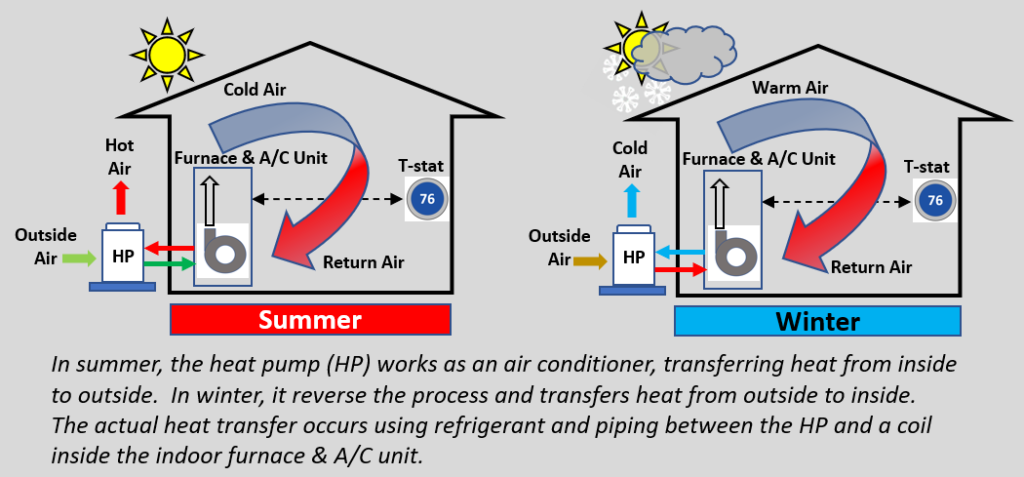Higher Temperatures Are a Serious Health Risk
More Energy Efficient Cooling Technologies are Needed
As climate change causes hotter temperatures, more and more people want to live in air conditioned spaces. A hotter world is a serious threat to the health of millions of people. Today it is estimated that more than 350,000 people die each year from excessive heat.[1] There’s no question that increased use of air conditioning will be a logical and necessary adaptation to global warming.
There have been numerous articles published recently about air conditioning (A/C) growth and the associated increased emissions of Greenhouse Gasses (GHGs). However, if we assume energy systems will be decarbonizing in the coming decades through increased use of solar, wind, nuclear, hydro and other clean sources, the steady growth of A/C might not have as much GHGs impact. So, there’s uncertainty in projections of GHGs change related to A/C deployment.
For this article, we’ll mainly focus on residential air conditioning. Individuals have choices on what type of A/C they use and when and how they use it. However, the bigger picture suggests governments, A/C manufacturers, electric grid companies and researchers have a significant role in helping to keep this important human need from driving higher GHG emissions and the associated climate change.
Current Picture
According to the International Energy Agency (IEA) [2]:
- There are about 1.6 billion air conditioning units in service today. By 2030, this number will grow to 5.6 billion.
- Whereas countries such as the U.S. and Japan have about a 90% penetration of A/C in households, only about 8% of the 2.8 billion people living in the hottest parts of the world have A/C.
Air conditioning is currently responsible for about 4% of global GHG emissions, including about 2 Gt-CO2. [3] (A Gt is a billion metric tons.)
- If the world keeps installing air conditioning with only incremental improvements in efficiency, some projections indicate residential air conditioning alone could lead to a 0.5ºC increase in global temperature by 2100.[4]
Increased use of A/C due to extremely hot weather has already caused some electric grid operators and governments to ask people to turn up the temperature on the A/C systems or curtail use. This happened in Texas in July. Both Spain and Greece currently require A/C systems be set no lower than 81°F/27°C to conserve electricity, which is partially sourced by burning natural gas in those countries.
As deployment of A/C increases in the future, grid operators and governments will need to closely watch both load growth and developments in A/C systems efficiencies.
How Air Conditioning Works
Air conditioning lowers the temperature and relative humidity in an enclosed space to achieve comfortable conditions for people. Temperature is lowered by transferring heat from indoors to outdoors. Humidity is lowered by condensing moisture in the air and taking it to a drain. If you want to understand A/C techies better, they refer to the temperature of air as “sensible heat” and moisture content (humidity) as “latent heat”.
The most common type of A/C system involves a complex process vapor compression cycle with coils, piping, compressors and fans, and uses a significant amount of electricity. This approach has served us well since its invention nearly 100 years ago, but new technologies are needed to vastly improve efficiency.
Heat pumps are similar to a common A/C system, but they run the vapor compression cycle in reverse during cold weather. This allows them to cool in hot weather and provide heating in cold weather. This is an effective heating method down to about 20°F/-6.7°C for typical heat pump systems, as the efficiency falls off below this temperature.

Efficiency Initiatives
There are some interesting initiatives aimed at developing more efficient approaches to residential and commercial A/C.
- In 2021 the U.S. Department of Energy funded 44 projects focusing on home energy efficiency, including heating and cooling. https://www.energy.gov/articles/doe-announces-nearly-83-million-increase-building-energy-efficiency-and-cut-consumers
- Gree Electric Appliances, Inc. of Zhuhai, China, a co-winner of the Global Cooling Prize, plans to bring products to market by 2025 that have 5 times less climate impact than current products. https://www.virgin.com/virgin-unite/latest/introducing-the-worlds-most-climate-friendly-air-conditioners
- The other winner of the Global Cooling Prize, Daikin with partner Nikken Sekkei Ltd. of Japan, has a concept using a refrigerant with very low global warming potential and the vaporization heat of water to achieve high efficiency. https://www.daikin.com/press/2021/210429
What Individuals Can Do
If you’re in a situation to choose a new or replacement A/C system, upfront cost is an important factor. However, you should take a look at the life-cycle cost of a high-efficiency A/C system or a heat pump. This may be tricky to calculate and the payback could be long, but rebates and tax credits may make high-efficiency more attractive. If you live in the U.S. the Inflation Reduction Act (IRA) of 2022 includes a provision for heat pump rebates of as much as US$8,000.[5] If your home needs an electrical panel update to accommodate energy efficiency upgrades, the IRA also allows for a rebate of up to $4,000.
The U.S. EPA ENERGY STAR rating is one way to compare the efficiency of home A/C systems. Here’s a link to their latest list: https://www.energystar.gov/products/most_efficient/central_air_conditioners_and_air_source_heat_pumps
The European Commission has a standard energy labeling system for A/C systems and other appliances.
If you use an electricity source that comes from fossil fuels, consider raising the temperature when you’re using A/C to lower electricity consumption. If you’re running your entire household load via solar panels on your roof, you can run your A/C as much as you want when the sun is shining. At night however, you’ll be drawing power from the utility grid or from the energy stored in batteries.
If you don’t have solar panels yet, the IRA of 2022 increases the federal tax credit for a new installation from the current 25% to 30%.
Keep an eye on cooling technology developments and incentives to install higher efficiency equipment. Improved efficiency is good for both the environment and household budgets in these times of high inflation. Since new technologies frequently are more expensive than those they replace, you may want to encourage elected representatives to support rebates and other incentives.
Summary
New air conditioning technologies that improve energy efficiency will benefit billions of people. Individual actions as outlined in this article can make a difference, but global action is needed by governments and businesses to effectively address the coming growth in deployment of air conditioning.
[1] The Lancet, Vol 398 August 21, 2021, Editorial, “Health in a world of extreme heat” https://www.thelancet.com/pdfs/journals/lancet/PIIS0140-6736(21)01860-2.pdf
[2] IEA, May 15, 2018, “Air conditioning use emerges as one of the key drivers of global electricity-demand growth” https://www.iea.org/news/air-conditioning-use-emerges-as-one-of-the-key-drivers-of-global-electricity-demand-growth
[3] National Renewable Energy Laboratory, NREL, March 14, 2022, “Research Effort by NREL and Xerox PARC Offers Predictions for 2050. It Suggests New Technologies are Needed” https://www.nrel.gov/news/press/2022/nrel-shows-impact-of-controlling-humidity-on-greenhouse-gas-emissions.html
[4] Rocky Mountain Institute and Global Cooling Prize Operating Council, “The AC Industry Conundrum Cooling Is Warming the Planet, but Market Failures Are Preventing the AC Industry from Innovating”, Elizabeth O’Grady and Saarthak Narsipur https://globalcoolingprize.org/the-ac-industry-conundrum/
[5] MarketWatch, August 13, 2022, “Here’s how the Inflation Reduction Act’s rebates and tax credits for heat pumps and solar can lower your energy bill” by Rachel Koning Beals https://www.marketwatch.com/story/heres-how-the-inflation-reduction-acts-rebates-and-tax-credits-for-heat-pumps-and-solar-can-lower-your-energy-bill-11659901660
